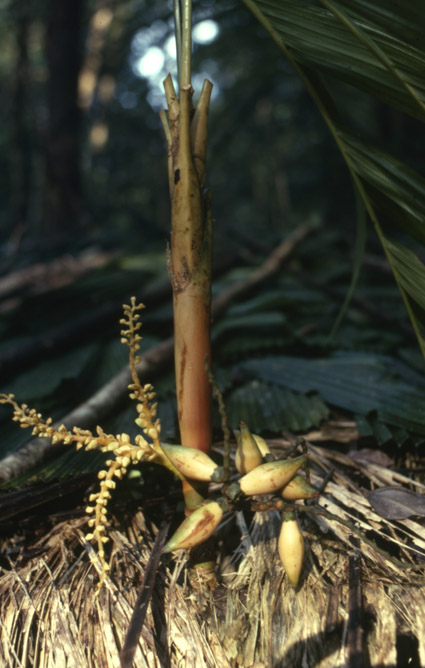- Acanthophoenix
- Acrocomia
- Actinokentia
- Actinorhytis
- Adonidia
- Aiphanes
- Allagoptera
- Ammandra
- Aphandra
- Archontophoenix
- Arenga
- Asterogyne
- Astrocaryum
- Attalea
- Bactris
- Balaka
- Barcella
- Basselinia
- Beccariophoenix
- Bismarckia
- Borassodendron
- Borassus
- Brassiophoenix
- Burretiokentia
- Butia
- Calamus
- Calyptrocalyx
- Calyptrogyne
- Calyptronoma
- Carpentaria
- Carpoxylon
- Caryota
- Ceratolobus
- Ceroxylon
- Chamaedorea
- Chamaerops
- Chambeyronia
- Chelyocarpus
- Chuniophoenix
- Clinosperma
- Coccothrinax
- Cocos
- Corypha
- Cryosophila
- Cyphokentia
- Cyphophoenix
- Cyphosperma
- Daemonorops
- Deckenia
- Desmoncus
- Dictyocaryum
- Drymophloeus
- Dypsis
- Elaeis
- Eleiodoxa
- Eremospatha
- Eugeissona
- Euterpe
- Gaussia
- Geonoma
- Guihaia
- Hedyscepe
- Hemithrinax
- Howea
- Hyophorbe
- Hyospathe
- Hyphaene
- Iriartea
- Iriartella
- Itaya
- Jailoloa
- Johannesteijsmannia
- Juania
- Jubaea
- Jubaeopsis
- Kentiopsis
- Kerriodoxa
- Korthalsia
- Laccospadix
- Laccosperma
- Lanonia
- Latania
- Lemurophoenix
- Leopoldinia
- Lepidocaryum
- Lepidorrhachis
- Leucothrinax
- Licuala
- Linospadix
- Livistona
- Lodoicea
- Lytocaryum
- Manicaria
- Manjekia
- Marojejya
- Masoala
- Mauritia
- Mauritiella
- Maxburretia
- Medemia
- Metroxylon
- Myrialepis
- Nannorrhops
- Nenga
- Neonicholsonia
- Neoveitchia
- Nephrosperma
- Normanbya
- Nypa
- Oenocarpus
- Oncocalamus
- Oncosperma
- Orania
- Oraniopsis
- Parajubaea
- Pelagodoxa
- Phoenicophorium
- Phoenix
- Pholidocarpus
- Pholidostachys
- Physokentia
- Phytelephas
- Pigafetta
- Pinanga
- Plectocomia
- Plectocomiopsis
- Podococcus
- Pogonotium
- Ponapea
- Prestoea
- Pseudophoenix
- Ptychococcus
- Ptychosperma
- Raphia
- Ravenea
- Reinhardtia
- Retispatha
- Rhapidophyllum
- Rhapis
- Rhopalostylis
- Roscheria
- Roystonea
- Sabal
- Sabinaria
- Salacca
- Saribus
- Satakentia
- Satranala
- Schippia
- Sclerosperma
- Socratea
- Solfia
- Sommieria
- Syagrus
- Synechanthus
- Tahina
- Tectiphiala
- Thrinax
- Trachycarpus
- Trithrinax
- Veitchia
- Verschaffeltia
- Voanioala
- Wallaceodoxa
- Wallichia
- Welfia
- Wendlandiella
- Wettinia
- Wodyetia
- Zombia
- x Jubautia splendens
- ?? Acoelorrhaphe
- ?? Bentinckia
- ?? Brahea
- ?? Clinostigma
- ?? Colpothrinax
- ?? Copernicia
- ?? Cyrtostachys
- ?? Dictyosperma
- ?? Dransfieldia
- ?? Heterospathe
- ?? Hydriastele
- ?? Iguanura
- ?? Incertae sedis & excluded names
- ?? Loxococcus
- ?? Micronoma
- ?? Paripon
- ?? Pritchardia
- ?? Rhopaloblaste
- ?? Serenoa
- ?? Washingtonia
Areca abdulrahmanii, Bot. J. Linn. Soc. 81: 33 (1980)
Primary tabs

Discussion
- It belongs to section Microareca by virtue of its small habit and spirally arranged staminate flowers. Together with A. abdulrahmanii and A. klingkangensis it forms a group of species distinctive in the conspicuously stipitate staminate flowers, but is immediately distinguishable from these two by the presence of only 6 stamens. (Dransfield, J. 1984: The genus Areca (Palmae: Arecoideae) in Borneo)A
Diagnosis
- ad sectionem Microarecam pertinens, floribus staminatis stipitatisque A. abdulrahmanii J. Dransf. et A. klingkangensi J. Dransf. affinis, sed calcicola et staminibus tantum 6 distincta. (Dransfield, J. 1984: The genus Areca (Palmae: Arecoideae) in Borneo)A
Biology And Ecology
- This is a lowland species, and was found growing in the unusual habitat of crevices in limestone. (Dransfield, J. 1984: The genus Areca (Palmae: Arecoideae) in Borneo)A
Etymology
- This new species is named for the collector, J. A. R. Anderson, who has collected many curious Bornean palms. (Dransfield, J. 1984: The genus Areca (Palmae: Arecoideae) in Borneo)A
Description
- Apparently solitary, short-stemmed, undergrowth palmlet. Stem to c. 2.5 m, 1.3 cm diam.; internodes to 1.5 cm, nodes marked by conspicuous leaf scars, c. 3 mm high; surface of internode dull green with sparse brown scales. Leaf sheaths forming a distinct crownshaft to 23 x 2 cm; sheaths 7-13 cm long with basal circumference 2-3 cm, striate, with sparse brown scales; ligule poorly developed. Leaf without sheath 65-80 cm including petiole to 30 x 0-3 cm; leaflets 2-3 on each side of the rachis, diverging at an angle of c. 30'; leaflets subequal, with up to 5 main ribs, acuminate except for the lobed apical pair, to c. 35 x 3 cm; lamina surfaces concolorous, ± glabrous on adaxial surface, with scattered brown scales on abaxial surface. Inflorescence infrafoliar; peduncle short, c. 10 x 3 mm; rachillae 3-4, divaricate, ± zig-zag, to 100 x 2 mm, covered in brown scales, each bearing 1-3 triads near the base, and spirally arranged pairs of staminate flowers distally. Staminate flower conspicuously stipitate, the stalk formed from the calyx base, glabrous, to 1.5 mm, the calyx tubular above the solid base, lobes 3, strongly keeled, narrow triangular, to 1 mm; corolla with 3 ovate apiculate petals to 3.5 x 1.75 mm; stamens 6, to 1.5 x 0.3 mm, anthers borne on short filaments; pistillode absent. Pistillate flower sessile with 3 imbricate, cucullate, apiculate free sepals to 4.5 x 3 mm, and 3 free imbricate apiculate petals to 4.5 x 2.5 mm; ovary to 7 x 2.5 mm, tipped with a beak and 3 stigmas. Immature fruit fusiform, 'ripening red', to 21 x 7 mm, tipped with stigmatic remains; seed immature, basally attached. (Dransfield, J. 1984: The genus Areca (Palmae: Arecoideae) in Borneo)A
- Log in to post comments

